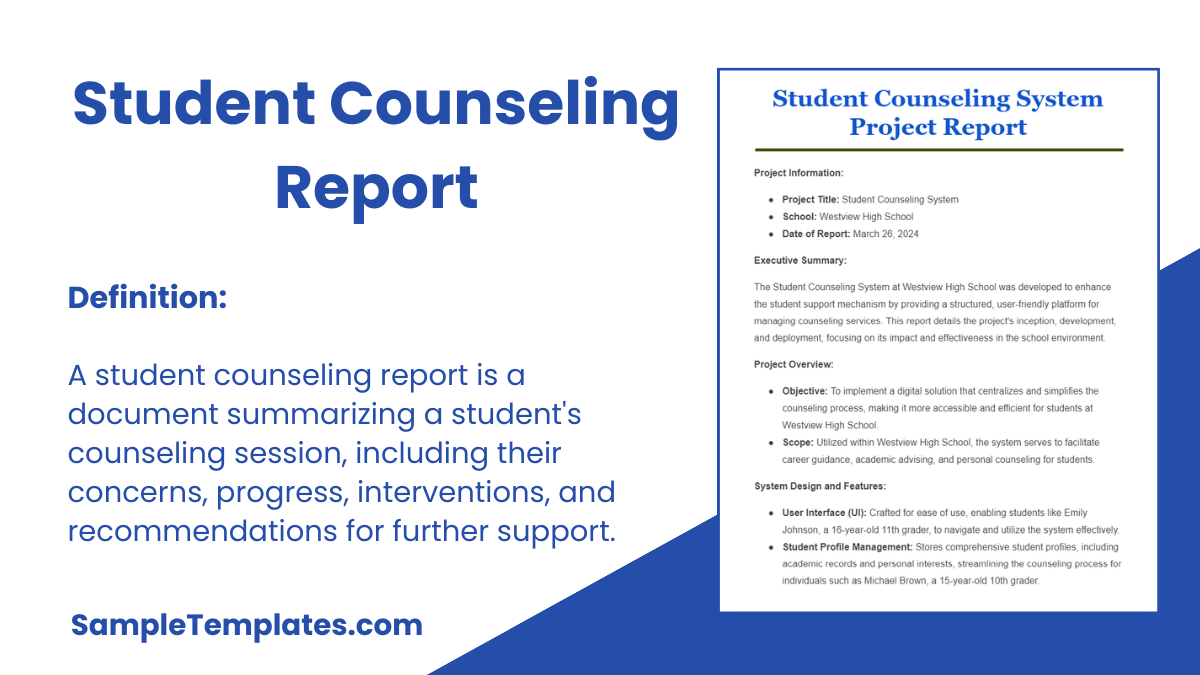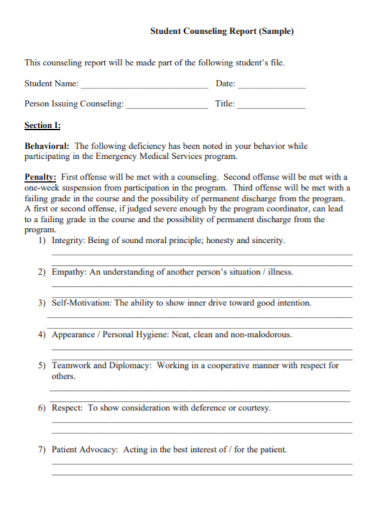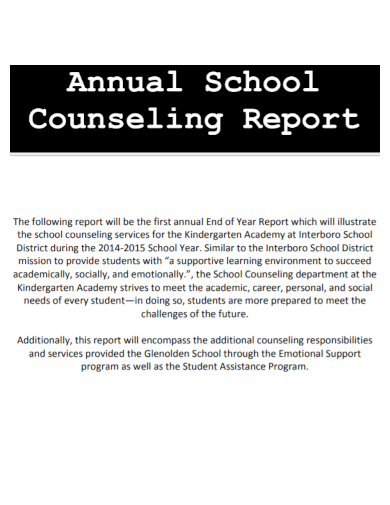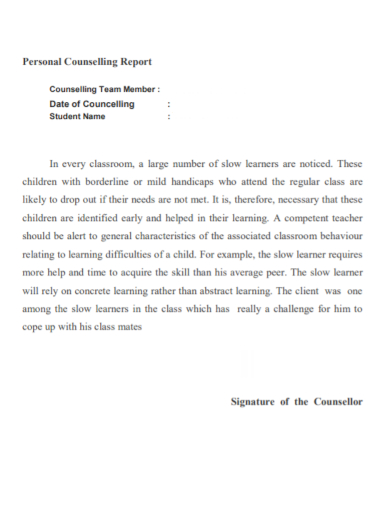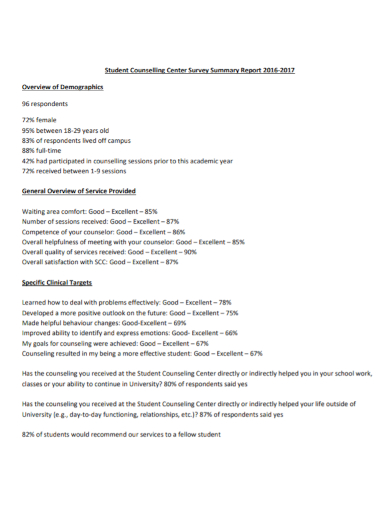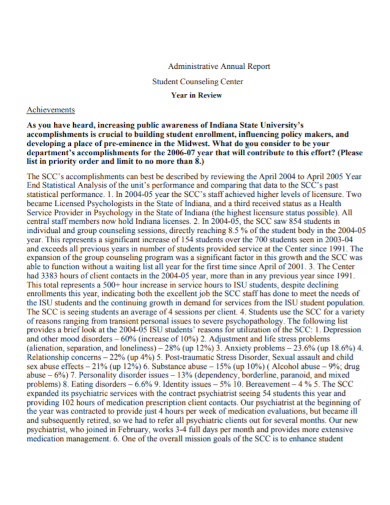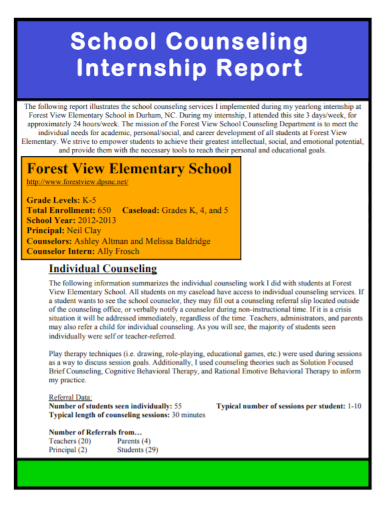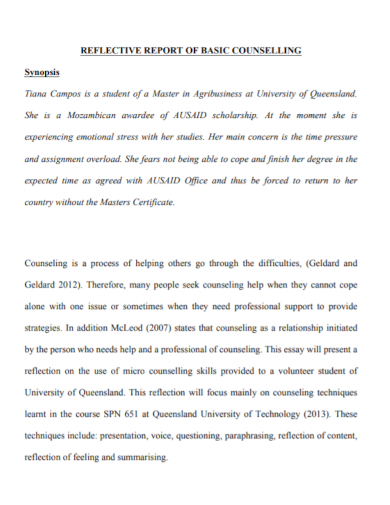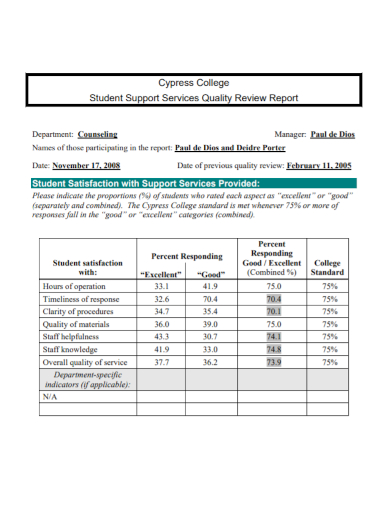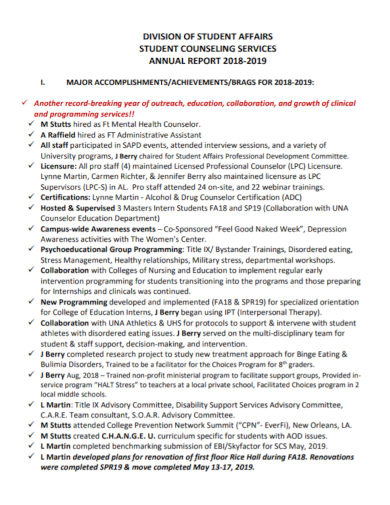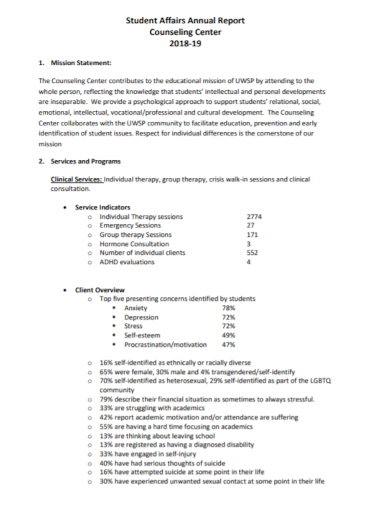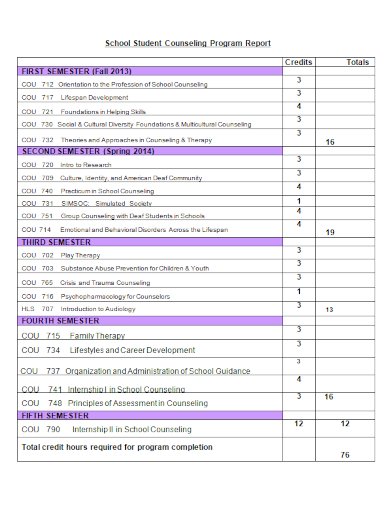It is a sad reality that anxiety, depression, eating disorders and other mental health problems are very common among students. However, as times have been advancing, so do the mental health assessment awareness movements. Students in most schools are being provided with free counseling services which are necessary not only to support their overall psychological well-being, but also to ensure scholastic retention and achievement. This also aims to lessen the stigma of mental illnesses so that young people will feel at ease when they ask for psychological help. And since counseling multiple students is not easy as it is, here are free ready-made Student Counseling Reports sample for your convenience! Scroll to see more!
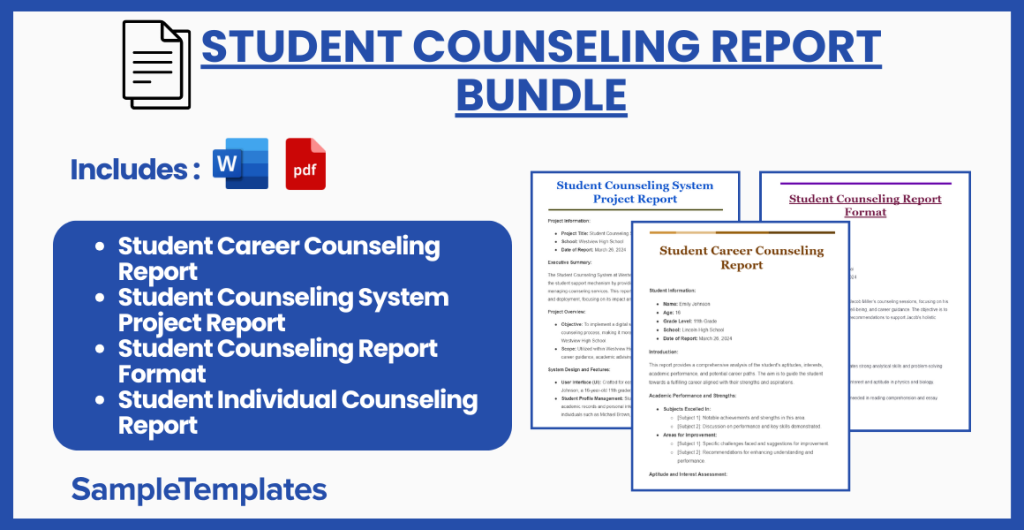
Download Student Counseling Report Bundle
Student Career Counseling Report
Student Information:
- Name: Emily Johnson
- Age: 16
- Grade Level: 11th Grade
- School: Lincoln High School
- Date of Report: March 26, 2024
Introduction:
This report provides a comprehensive analysis of the student’s aptitudes, interests, academic performance, and potential career paths. The aim is to guide the student towards a fulfilling career aligned with their strengths and aspirations.
Academic Performance and Strengths:
- Subjects Excelled In:
- [Subject 1]: Notable achievements and strengths in this area.
- [Subject 2]: Discussion on performance and key skills demonstrated.
- Areas for Improvement:
- [Subject 1]: Specific challenges faced and suggestions for improvement.
- [Subject 2]: Recommendations for enhancing understanding and performance.
Aptitude and Interest Assessment:
- Interests:
- [Interest 1]: Description of how this interest aligns with potential career paths.
- [Interest 2]: Analysis of the student’s engagement and enthusiasm in this area.
- Aptitude Test Results:
- [Aptitude Area 1]: Score and interpretation.
- [Aptitude Area 2]: Score and what it suggests about the student’s abilities.
Career Interest Survey Results:
- Preferred Career Fields:
- [Career Field 1]: Reasons for interest and potential fit.
- [Career Field 2]: Analysis of how this aligns with the student’s skills and preferences.
Counselor’s Observations and Recommendations:
- Strengths:
- Description of key strengths and how they can be leveraged in various career paths.
- Potential Careers:
- [Career 1]: Justification based on the student’s academic performance, interests, and aptitude test results.
- [Career 2]: Exploration of how this career aligns with the student’s strengths and future aspirations.
- Action Plan:
- Short-term goals: Specific actions the student can take in the next 6-12 months to explore or prepare for the recommended careers.
- Long-term goals: Strategies for academic and personal development to facilitate career readiness.
Conclusion:
Summarize the key findings of the report and the proposed plan to assist the student in achieving their career goals, emphasizing the importance of aligning their strengths and interests with their career path.
Appendix:
- Detailed results of the aptitude and interest assessments.
- Additional resources for career exploration and planning.
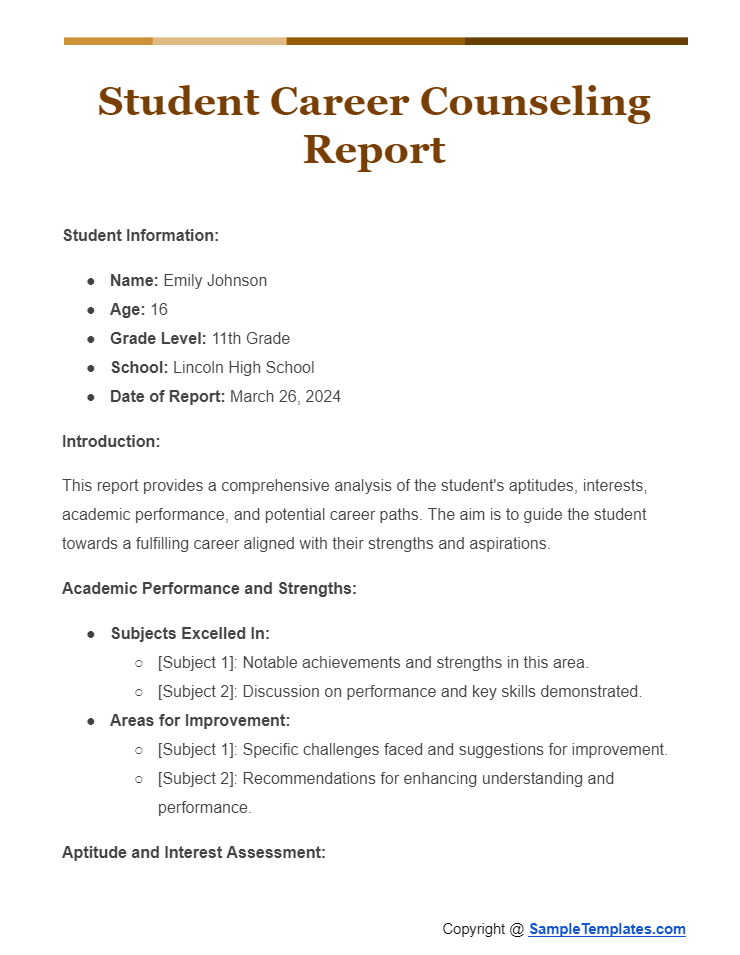
Student Counseling System Project Report
Project Information:
- Project Title: Student Counseling System
- School: Westview High School
- Date of Report: March 26, 2024
Executive Summary:
The Student Counseling System at Westview High School was developed to enhance the student support mechanism by providing a structured, user-friendly platform for managing counseling services. This report details the project’s inception, development, and deployment, focusing on its impact and effectiveness in the school environment.
Project Overview:
- Objective: To implement a digital solution that centralizes and simplifies the counseling process, making it more accessible and efficient for students at Westview High School.
- Scope: Utilized within Westview High School, the system serves to facilitate career guidance, academic advising, and personal counseling for students.
System Design and Features:
- User Interface (UI): Crafted for ease of use, enabling students like Emily Johnson, a 16-year-old 11th grader, to navigate and utilize the system effectively.
- Student Profile Management: Stores comprehensive student profiles, including academic records and personal interests, streamlining the counseling process for individuals such as Michael Brown, a 15-year-old 10th grader.
- Appointment Scheduling: Automated tools allow for efficient booking and management of sessions, directly benefiting students and counsellors alike.
- Counseling Session Records: Detailed documentation of each session aids in the continuous support and development of students, ensuring a tailored approach to individual needs.
- Reporting and Analytics: Generates insightful reports on service utilization and student progress, aiding in strategic planning and improvement of counseling services.
Technology Stack:
- Frontend: Utilizes modern web technologies for a responsive interface, enhancing the experience for users like Sarah Lee, a 17-year-old 12th-grade student.
- Backend: Robust server-side processing supports the complex data management needs of the system.
- Database: Secure and scalable database solutions handle the extensive data of the school’s student population.
- Security: Advanced security measures protect sensitive data, ensuring privacy and trust in the system.
Implementation Plan:
- Requirement Analysis: Included feedback from a diverse group of stakeholders, including students, counsellors, and administrative staff.
- System Design: Developed a prototype that was iteratively refined through stakeholder input, including from key users like David Smith, a school counsellor.
- Development Phase: Focused on creating a reliable and effective system, tested through real-world scenarios in the school setting.
- Deployment: Successfully launched at Westview High School, with comprehensive training programs for users like Lisa Nguyen, a guidance counsellor.
- Maintenance and Support: Ongoing support ensures the system remains up-to-date and responsive to the school’s evolving needs.
Challenges and Solutions:
- Data Security: Implemented state-of-the-art security measures to safeguard the personal and academic information of students.
- User Adoption: Conducted extensive training and created user-friendly manuals to ensure smooth transition and usage by the school community.
- Scalability: Designed with future expansion in mind, allowing for easy integration of new features and user growth.
Conclusion:
The implementation of the Student Counseling System at Westview High School has significantly improved the efficiency and effectiveness of the counseling services offered. By providing a comprehensive, easy-to-use platform, the system supports the holistic development of students, ensuring they receive the guidance and support necessary for their academic and personal growth.
Appendix:
- Technical specifications and user guides.
- Training materials and feedback forms from initial users.
- Performance and usage analytics post-implementation.
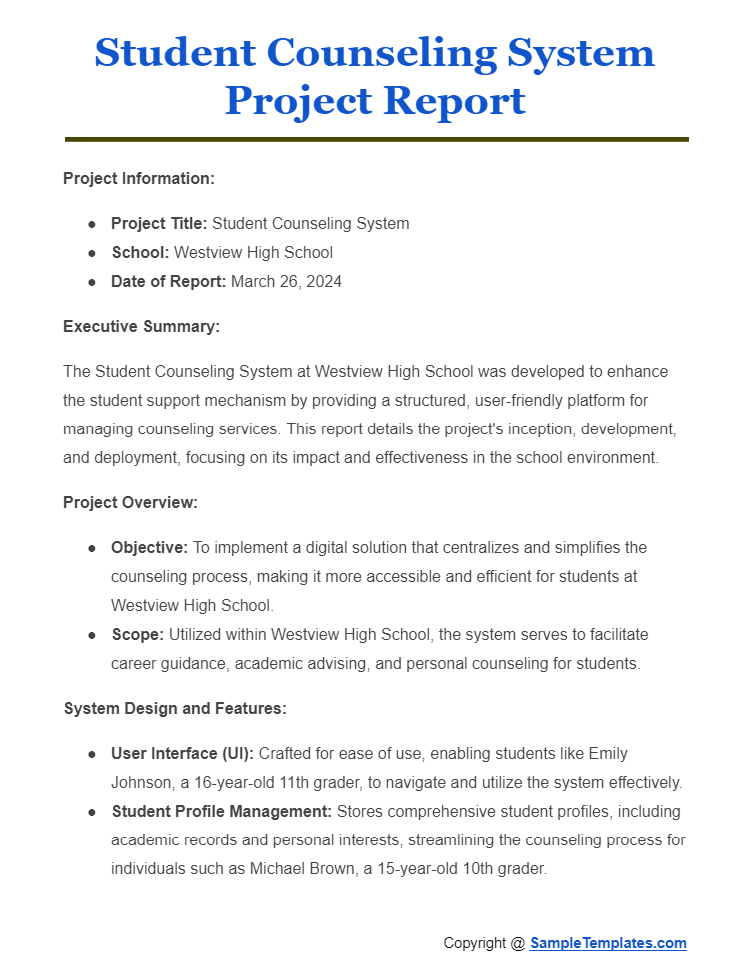
Student Counseling Report Format
Student Information:
- Name: Jacob Miller
- Age: 15
- Grade Level: 10th Grade
- School: Westview High School
- Date of Report: March 26, 2024
Introduction:
This report provides an overview of Jacob Miller’s counseling sessions, focusing on his academic performance, emotional well-being, and career guidance. The objective is to outline the progress, concerns, and recommendations to support Jacob’s holistic development.
Academic Performance:
- Current GPA: 3.8
- Strengths:
- Math: Jacob demonstrates strong analytical skills and problem-solving abilities.
- Science: Shows keen interest and aptitude in physics and biology.
- Areas for Improvement:
- English: Improvement needed in reading comprehension and essay writing.
- Social Studies: Needs to engage more in class discussions and group projects.
Counseling Sessions Overview:
- Attendance: Jacob attended 6 sessions over the past semester.
- Key Focus Areas:
- Time Management: Worked on developing effective study schedules.
- Stress Management: Introduced relaxation techniques and coping strategies.
- Career Exploration: Discussed interests and potential career paths in STEM fields.
Emotional and Social Well-being:
- Observations:
- Jacob is generally positive but has expressed anxiety related to academic pressures and future college plans.
- Socially active with a close group of friends, yet shows reluctance in participating in larger group activities.
Career Guidance:
- Interests: Shows a strong inclination towards engineering, particularly aerospace.
- Aptitude: Excellent in mathematics and physics, supporting his career interest.
- Recommendations: Encouraged to explore summer internships in engineering and attend college fairs to gain insight into the aerospace field.
Recommendations and Action Plan:
- Academic:
- Tutoring in English and Social Studies to improve grades.
- Participation in study groups to enhance learning and engagement.
- Personal Development:
- Continue with stress management techniques and consider joining a school club to improve social engagement.
- Career Planning:
- Visit colleges offering strong engineering programs and meet with career counsellors to discuss scholarship opportunities.
Conclusion:
Jacob is a promising student with strong capabilities in math and science. Continued support in academic and emotional areas, coupled with targeted career guidance, will be crucial in helping him achieve his full potential.
Next Review Date:
- September 15, 2024
Counsellor’s Name and Signature:
- Counsellor: Mrs. Laura Smith
- Signature: [Counsellor’s Signature]
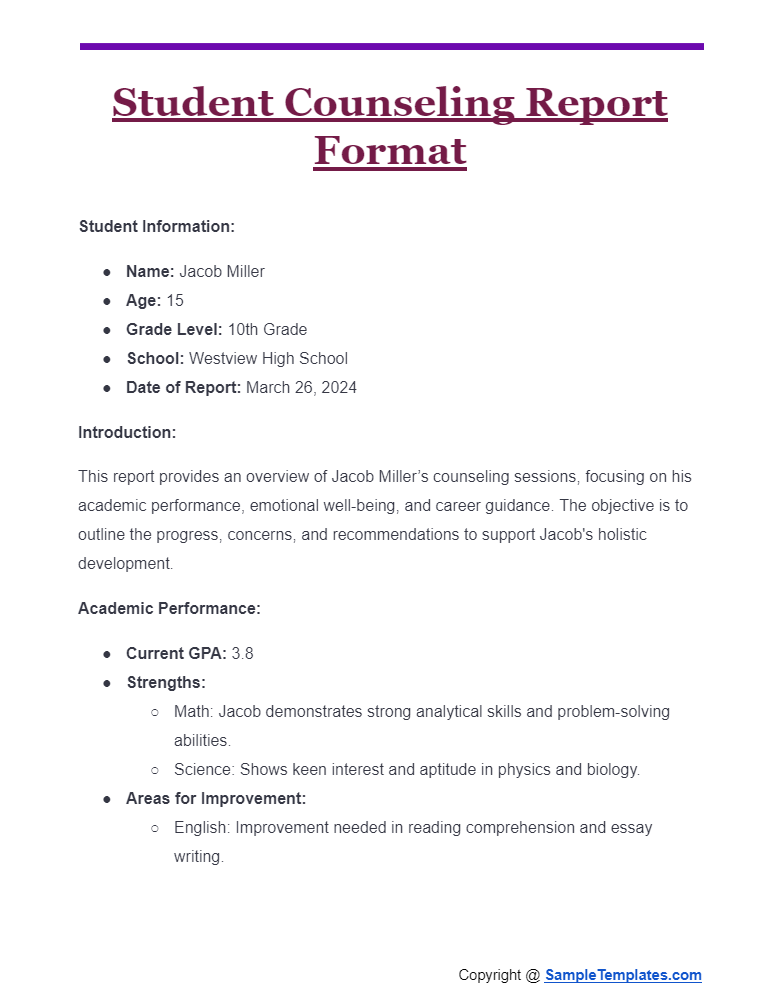
Student Individual Counseling Report
Student Information:
- Name: Alex Rivera
- Age: 15
- Grade Level: 10th Grade
- School: Westside High School
- Date of Report: March 26, 2024
Introduction:
This report summarizes the individual counseling sessions conducted with Alex Rivera, focusing on his academic performance, social interactions, and emotional well-being. The goal is to provide insights and recommendations to support Alex’s personal and academic development.
Counseling Sessions Overview:
- Date of Sessions:
- Session 1: January 10, 2024
- Session 2: February 14, 2024
- Session 3: March 20, 2024
- Key Focus Areas:
- Academic concerns and performance analysis.
- Social relationships and peer interactions.
- Emotional health and personal challenges.
Academic Performance:
- Strengths:
- Alex has shown strong abilities in scientific reasoning and has a keen interest in biology and chemistry.
- Challenges:
- Struggles with mathematics, particularly algebra and geometry, leading to decreased motivation and confidence.
Social Interactions:
- Observations:
- Alex is generally well-liked by peers but tends to isolate himself during group activities.
- Feedback:
- Has expressed feelings of anxiety in large social gatherings and prefers one-on-one interactions.
Emotional Well-being:
- Concerns:
- Alex has reported occasional feelings of stress and overwhelm, primarily due to academic pressures and high expectations.
- Support Provided:
- Discussed stress management techniques and provided resources for building resilience and coping skills.
Counselor’s Observations and Recommendations:
- Strengths to Build Upon:
- Encourage Alex’s exploration of science fields and consider extracurricular activities or clubs related to his interests.
- Areas for Development:
- Provide additional support in mathematics, possibly through tutoring or peer study groups.
- Recommend participation in social skills workshops or small group activities to enhance social engagement.
- Emotional Support:
- Continue to monitor Alex’s stress levels and recommend therapeutic interventions if necessary, such as counseling sessions or mindfulness practices.
Action Plan:
- Short-term Goals:
- Improve mathematics grade by at least one letter grade before the end of the semester.
- Join at least one extracurricular club or activity related to a personal interest.
- Long-term Goals:
- Develop a balanced approach to academic and social life to enhance overall well-being and satisfaction.
Conclusion:
Alex Rivera shows potential in various areas but faces challenges that affect his academic and social experiences. With targeted support and ongoing counseling, it is expected that Alex will make significant progress in addressing these challenges and realizing his full potential.
Appendix:
- Detailed session notes and progress tracking charts.
- List of resources provided to the student, including tutoring services, extracurricular clubs, and mental health support contacts.
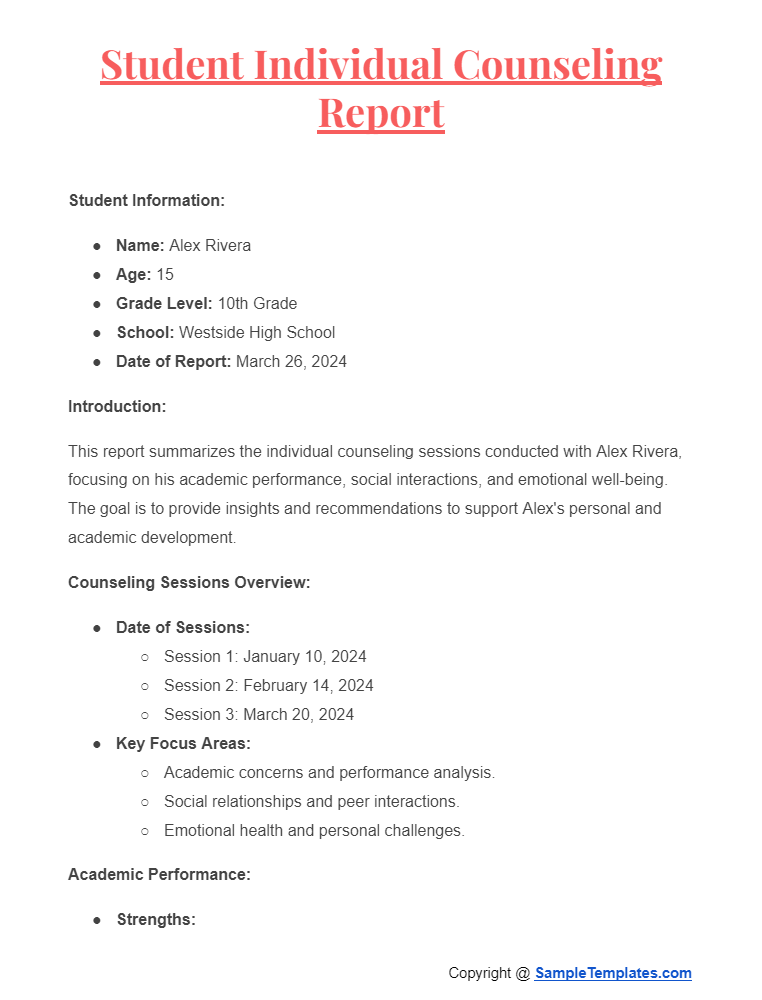
Browse More Templates On Student Counseling Report
1. Student Counseling Report Example PDF
What is the Purpose of a Student Counseling Report?
The purpose of a Student Counseling Report is multifaceted, primarily aiming to provide a comprehensive overview of a student’s well-being, academic progress, and any associated challenges. These sample reports serve as crucial documentation for educators, administrators, and parents to collaboratively support the student’s growth and success.
The report typically encapsulates various dimensions, including emotional and social development, behavioral patterns, and academic achievements. Through a detailed analysis of these aspects, counselors can identify patterns, trends, or areas of concern, facilitating targeted interventions.
Moreover, the report outline acts as a communication tool, fostering collaboration among educational stakeholders. It serves as a bridge between counselors, teachers, parents, and administrators, ensuring a holistic understanding of the student’s needs. This collaborative approach enhances the effectiveness of support mechanisms, promoting a conducive learning environment.
Confidentiality is paramount in these reports, and they adhere to ethical standards to protect students’ privacy. By offering insights into the student’s journey, challenges, and progress, a well-crafted Student Counseling Report becomes an instrumental resource in promoting student well-being, academic success, and overall personal development within the educational ecosystem.
2. School Counseling Report Sample
What Information is Usually Included in a Student Counseling Report?
A student counseling report writing is a comprehensive document that encapsulates the student’s counseling journey, aiming to provide a detailed overview of their mental health and well-being. Typically, it includes:
- Student Information: Basic details such as name, age, grade, and contact information.
- Reason for Counseling: A clear statement outlining the primary reason for seeking counseling, whether academic, personal, or emotional.
- Background and History: A brief overview of the student’s personal, academic, and familial background, offering context to their current situation.
- Assessment and Evaluation: Summaries of any assessments, evaluations, or diagnostic tools used to understand the student’s mental health.
- Counseling Goals: Clearly defined goals collaboratively set by the counselor and student, indicating the desired outcomes of the counseling sessions.
- Intervention Strategies: Detailed descriptions of counseling techniques, interventions, or therapeutic approaches applied during sessions.
- Progress and Achievements: Tracking the student’s progress over time, highlighting milestones, breakthroughs, or challenges overcome.
- Recommendations: Suggestions for further interventions, potential referrals, or additional resources to support the student’s well-being.
- Collaboration with Others: Information on any collaboration with teachers, parents, or other professionals involved in the student’s life.
- Confidentiality Statement: A reminder of the confidentiality agreement, emphasizing the limits and exceptions to maintain ethical standards.
This comprehensive report serves as a valuable tool for ongoing counseling, ensuring continuity of care and fostering a holistic approach to student well-being.
3. Student Counseling Report Sample
How Often are Student Counseling Reports Updated or Reviewed?
Student Counseling Reports are typically updated and reviewed at regular intervals, ensuring ongoing support and tracking progress. The frequency of updates depends on various factors such as the nature and severity of the student’s concerns, institutional policies, and the counseling plan in place.
In many educational settings, counsellors aim for regular updates, often occurring every few weeks or at significant milestones in the counseling process. This consistent monitoring allows for adjustments to the counseling approach based on the student’s evolving needs and responses to interventions.
During these reviews, counsellors may assess the effectiveness of implemented strategies, evaluate changes in the student’s behavior or well-being, and discuss any new developments. The collaborative nature of the review process encourages open communication between the counsellor and the student, fostering a trusting relationship.
The timing of updates also considers the urgency of the student’s concerns. Critical issues may warrant more frequent reviews, ensuring timely and responsive interventions. Conversely, for long-term counseling plans, reviews may be less frequent but still structured to track progress over extended periods.
Overall, the regular updating and reviewing of Student Counseling Reports are integral to the success of the counseling process, promoting continuous improvement and tailored support for each student’s unique needs.
In What Situations is a Student Counseling Report Initiated?
A Student Counseling Report is initiated in various situations to address the mental, emotional, or behavioral well-being of a student. Primarily, these reports are triggered when a student exhibits signs of distress, struggling academically, facing interpersonal issues, or dealing with emotional challenges. Common situations include academic underperformance, changes in behavior, sudden social withdrawal, or expressions of emotional distress. Additionally, reports may be initiated in response to external factors such as bullying, family issues, or traumatic events affecting the student.
The initiation of a Student Counseling Report involves collaboration between teachers, parents, or other concerned parties who observe these signs. Once initiated, the counseling process aims to understand the root causes, assess the student’s mental health, and implement appropriate interventions. The report serves as a comprehensive record, documenting the initial concerns, counseling strategies employed, and progress over time. It plays a crucial role in fostering communication among educators, parents, and counsellors, facilitating a holistic approach to student well-being. The ultimate goal is to provide tailored support, helping the student navigate challenges and promoting their overall academic and personal growth.
4. Counseling Report Format
What are the 5 stages of the counseling process?
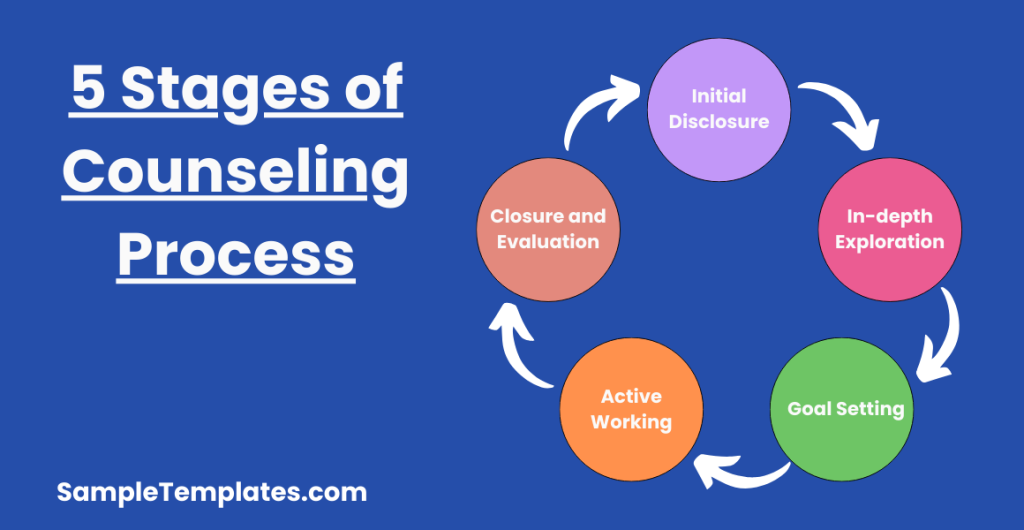
The counseling process typically unfolds in five distinct stages, each playing a crucial role in facilitating client growth, problem resolution, and personal insight. These stages help structure the therapeutic journey, ensuring that the counselor and client work together effectively toward achieving the client’s goals. The five stages are:
- Establishing Rapport and Building Trust (Initial Disclosure):
- In the first stage, the counselor works to create a safe and welcoming environment for the client. Establishing rapport involves demonstrating empathy, respect, and unconditional positive regard. Building trust is crucial for a productive therapeutic relationship, as it encourages open and honest communication.
- Identifying and Clarifying Problems or Issues (In-depth Exploration):
- Here, the counselor helps the client articulate their feelings, thoughts, and issues more clearly. Through active listening and questioning, the counselor assists the client in exploring their concerns in depth and identifying underlying problems. This stage is essential for setting specific, achievable goals.
- Setting Goals and Developing a Plan of Action (Goal Setting):
- Together, the counselor and client collaboratively set short-term and long-term goals. These goals should be SMART: Specific, Measurable, Achievable, Relevant, and Time-bound. They then develop a plan of action that outlines the steps needed to achieve these goals, considering the client’s strengths and potential barriers.
- Intervention and Working Through Challenges (Active Working):
- During this stage, the counselor employs various therapeutic techniques and interventions tailored to the client’s needs, helping them work through challenges and make changes. This stage may involve learning new skills, developing coping strategies, and challenging existing thought patterns. The counselor supports the client in implementing their action plan, adjusting it as needed based on progress.
- Evaluation, Termination, or Referral (Closure and Evaluation):
- The final stage involves evaluating the client’s progress towards their goals and determining the next steps. If the goals have been met, the counselor and client prepare for termination of the counseling relationship, discussing strategies for maintaining progress and addressing future concerns. If further support is needed, the counselor may suggest additional sessions or refer the client to other resources or specialists.
Each stage of the counseling process is flexible and iterative, allowing the counselor and client to revisit and adjust earlier steps as needed. This structured approach ensures that the counseling experience is focused, dynamic, and tailored to the individual’s unique needs and goals.
5. Individual Counseling Report PDF
6. Sample of Guidance and Counseling Report
Tips For Writing a Student Counseling Report
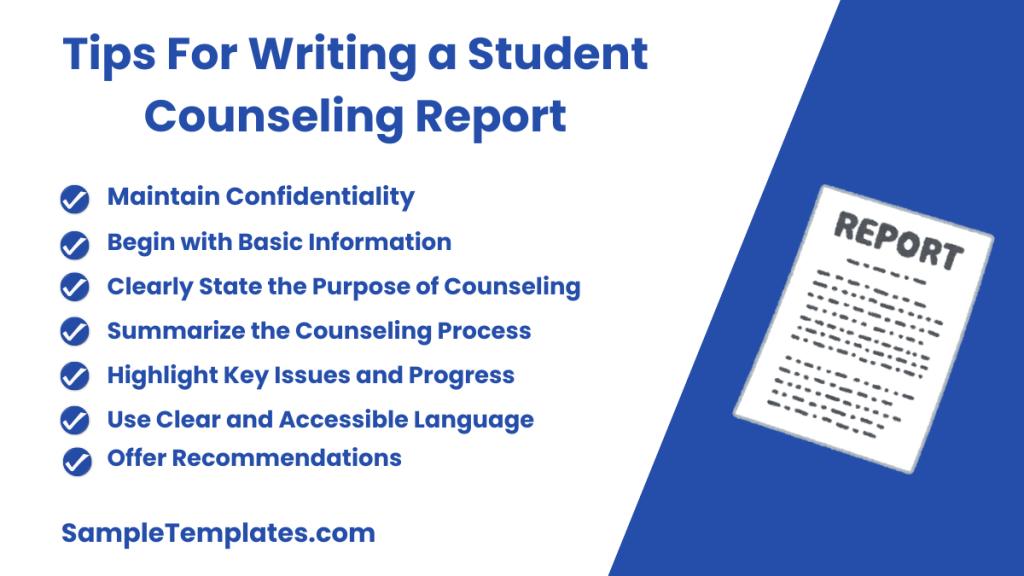
- Maintain Confidentiality: Always protect the student’s privacy. Use initials or pseudonyms if you’re sharing the report with unauthorized persons, and securely store all documents.
- Begin with Basic Information: Start your report with basic details such as the student’s name (or initials for privacy), age, grade level, and the date(s) of the counseling sessions.
- Clearly State the Purpose of Counseling: Outline the reasons the student sought counseling, whether it was self-referred, suggested by a teacher, or mandated by administration.
- Describe Observations and Assessments: Include objective observations about the student’s behavior, emotional state, and verbal expressions. Note any formal assessments used to understand their issues better.
- Summarize the Counseling Process: Briefly describe the interventions or strategies employed during the sessions, emphasizing the therapeutic approaches and techniques that were used.
- Highlight Key Issues and Progress: Discuss the main issues addressed during the counseling sessions and any progress the student made towards their goals. Be specific about changes in behavior, attitude, or understanding.
- Use Clear and Accessible Language: Avoid jargon and technical terms that may not be easily understood by everyone reading the report. When necessary, provide explanations for specialized terms.
- Incorporate Direct Quotes Sparingly: Use direct quotes from the student to illustrate specific points or convey the student’s thoughts and feelings accurately. However, use these sparingly and ensure they serve a clear purpose.
- Offer Recommendations: Based on the counseling outcomes, provide recommendations for further action. This might include additional counseling sessions, referrals to specialists, academic accommodations, or strategies for teachers and parents to support the student.
- End with a Summary and Next Steps: Conclude your report with a brief summary of the counseling outcomes and suggested next steps. If follow-up is necessary, specify who will be responsible and the timeline.
7. Counseling Report
What to Write in a Counseling Report?
- Student’s identifying information.
- Date and location of the counseling session.
- Reason for counseling.
- Summary of the discussion and topics covered.
- Observations of the student’s behavior and emotions.
- Goals or action plans agreed upon.
- Any recommendations or referrals.
- Counselor’s observations and professional opinions.
- A closing statement or future appointments if necessary.
- The report should be concise, objective, and focused on the counseling session’s outcomes.
8. Report on Counseling Session for Students
9. Counseling Report Writing
10. Counseling Report on Students
11. How to Write Counseling Report of Students
What Is a Student Counseling Report?
Counseling is provided to students in grades Kindergarten to Grade 12 in both public and private schools. It aids in the shaping of a student’s behavior as well as the instillation of sufficient discipline. School counselors help youths who present various levels of need for unique assistance, requiring assist with formative issues and issues intrinsic in their own conditions. Students who are adequately guided and counseled would know what to do and how to do things in the best possible way, which helps them reach their goals. This is because the counseling aims to uphold the student’s mindfulness, emotional wellness and prosperity to encourage accomplishment in gathering their scholastic objectives and throughout everyday life. A Student Counseling Report, then, acts as a record of the counseling meeting schedule and provides a diagnosis or remedy for the individual being counseled to follow in future sessions.
How to Make a Student Counseling Report
A Student Counseling Report strives to help students deal with anxiety and stress by helping them become self-aware and attain their full potential. This creates a cheerful and comfortable environment for kids to talk about their academic and social concerns. Aside from the free and ready-made templates of Student Counseling Reports provided above, you can also make one of your own from scratch. If you’re interested in making your own specific to your school and students, here are some basic tips to guide you in your report outline:
1. Begin with the fundamentals
First of all, list down the student’s information. This includes the session’s date and time, what situations prompted them to seek counseling, and more. You can detail their grievance, disciplinary record, or who made the sample recommendation in this intake-type form.
2. Take Thorough Notes
Since this analysis report could be used as the official record of the counseling session, it should be as precise as possible. You can audio record the session and ready some questions before the counseling even started. This is to make sure to not only get all the details, but also make sure that they are accurate.
3. Include All Necessary Information
You need to include all the needed information. This is why it is important to audio record if you want exact quotes from the students, and if you didn’t record, you can just paraphrase what they said. Of course, remember to jot down the vital details, and if you need clarification from the student’s sample statements, you must come up with reply questions.
4. End the Report with Recommendations
The best way to conclude a report is a sample plan for the student and a summary of the session. Never forget to include the important parts and the main takeaway from the encounter. Also, set a goal for the student and make a list of therapy or follow-up sessions you recommend. All in all, just finish the report with your final thoughts as the counsellor.
FAQ
How to Counsel a Student?
Student Counseling helps students develop self-awareness, skills, mental health, and well-being in order to achieve academic and life success. Free personal, crisis management, and developmental counseling, as well as educational programming and outreach, are provided by Student Counseling.
What Services do School Counselors Provide to Students?
School counselors work with kids to help them succeed academically, personally, and socially, as well as explore their choices after high school statement. A high school counselor can assist students who are having academic or personal difficulties.
What are the Benefits of Counseling for Students?
It aids in the shaping of a student’s behavior as well as the instillation of sufficient discipline. Students who are adequately guided and counseled know what to do and how to do things in the best possible way, which helps them reach their personal goals.
What is Counseling of Students?
Counseling of students is a supportive process that involves providing guidance, advice, and emotional support to students in various aspects of their academic, personal, and social lives. It aims to help students address challenges, make informed decisions, and achieve their educational and personal goals. Counseling may cover academic issues, career choices, mental health, and personal development.
The future relies on the youth, which is why it is very important to accommodate them with their needs, mental stability being one of the most important. Counseling is an amazing way to check in on them, so we hope you have found our article helpful! Download our free and customizable Student Counseling Report for the psychological well-being of the students!
Related Posts
Sample Chemistry Lab Reports
School Accomplishment Report Samples & Templates
Field Report Samples & Templates
Sample Science Project Reports
Business Report Samples & Templates
Survey Reports Samples & Templates
Sample Feasibility Reports
Psychological Assessment Report Samples [ Clinical, Child, Intake ]
Report Format Samples & Templates
Acknowledgement for Internship Report Samples [ Hotel, Hospital, Teaching ]
Field Trip Report Samples [ Agriculture, Educational, Environmental ]
Narrative Accomplishment Report Samples [ Science, Teacher, Reading ]
Sample Acknowledgment Report Templates
Internship Narrative Report Samples
Interview Summary Report Samples
